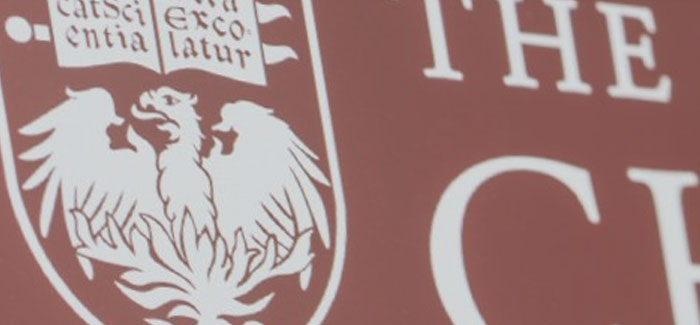The state as history and theory
Elisabeth Clemens aims to bring together history, political science, and sociology in one of the Neubauer Collegium's inaugural projects.
Elisabeth Clemens, AM'85, PhD'90 (Sociology), professor and chair of the Department of Sociology, is leading one of the Neubauer Collegium's inaugural projects, the State as History and Theory. She discusses what she and her colleagues--James Sparrow, an associate professor in the history department, and Bernard Harcourt, the Julius Kreeger Professor of Law and chair of the political science department--hope to pursue in their collaboration.
What are you aiming to do with the State as History and Theory?
We're hoping to bring together a set of conversations about new directions at the intersection of sociology, political science, and history that happen in a fragmented way. We're all reading on different schedules, going to different conferences, and speaking on different panels. It's clear that there's a collective need among the three of us, and also more broadly in our disciplines, to rethink the organization of power and governance in contemporary democracies. At one level, we are trying to recreate some of the key aspects of graduate school for people already well advanced in their careers. We want to read recent important texts together and think about how to link them to our varied political, empirical, and theoretical efforts. This is what the Collegium does: provide a platform for focused discussion and research that many of us miss as we progress into a career with individualized scholarly and disciplinary connections.
What are some empirical projects you'll take on?
This is a sort of meta-collaboration. There's been a series of panels for almost three years, drawing together political scientists, sociologists, and historians at the Social Science History Association. They have been working on a wide range of empirical topics while trying to get a handle on how we think about the organization of governance beyond bureaucracy, elections, and legislatures, recognizing that power is organized in ways that are not obviously public. For example, in recent wars, war fighting is a central activity of the modern state, yet from the beginning of recent American conflicts, a large proportion of our presence has been through private contractors, so the exercise of power operates through private firms rather than public agencies. A second example would be tax subsidies: how does the abdication of a right to tax certain kinds of activities shape fields of activity indirectly? It's looking at the edges, strands, and networks of governance that extend well beyond formal political agencies. That often gets misrecognized as not government.
So what comes next?
Next year we're bringing in Stephen Sawyer, AM'97, PhD'08, a visiting faculty member from the American University in Paris, who is an interlocutor between work on American political development and European theorizations of the state. By the end of next year, we all hope to bring these debates together by advancing a number of medium-term projects, such as some ongoing, rolling conference panels on the forms and functions of the contemporary state that have been largely organized through the Social Science History Association. We also hope to have developed a theoretical conversation linked to a set of empirical projects. For me, I hope it will provide a basis for clarifying my next individual project and linking it into some contemporary debates over the nature of democratic governance. I'm both recovering from too long in administration and from finishing a book. This collaboration represents an opportunity to define a next project during a year of intensive reading and wide-ranging conversation.
What will Sawyer bring to the project?
Steve has been part of a set of conferences on comparative political development that has largely occurred among historians. He has collaborated with Jim Sparrow, and he and Bernard Harcourt became involved in translating some Michele Foucault lectures. I met him at past conferences. So he had ties already but has been in Europe in a different set of literatures. He brings that to the conversation, as well as a deep understanding of the longstanding questions here.
What book projects will the group take on?
We imagine a set of books. I have a chapter in one book, called Boundaries of the State, which Sparrow and Sawyer are already editing. We hope to facilitate another project that many of us would have papers in and also to have something that would be a theoretical reader, which would bring some of these recent and often sketch-like theoretical efforts together in an accessible way.
Meanwhile, you're finishing your own book.
I'm finishing a book that has nothing to do with this project. It's about the role of benevolence in American state formation. So organized donations of both money and time are a central element of our country's mobilization of power. You can think of it as both straight volunteering and charity, but many wars and disasters are also funded by volunteer contributions and loans. That's a very odd way of doing governance, and yet it's quite central for much, if not all, of American history.

